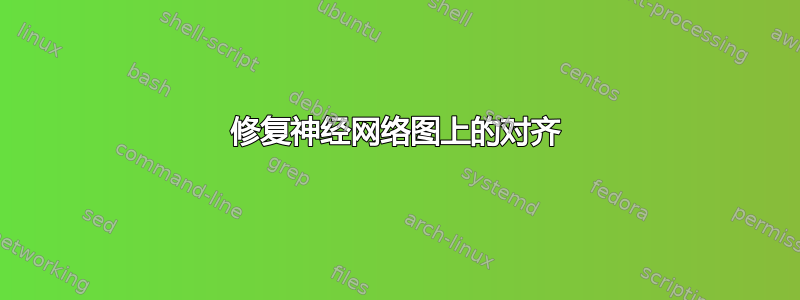
我正在研究一些简单的神经网络图,但在对齐工作方面遇到了一些麻烦。有人能帮我弄清楚如何让隐藏节点和输出节点的对齐工作正常吗?我只是不确定如何处理这些图中的偏移量。
这是图片,后面是代码。
\documentclass[12pt, a4paper, oneside, headinclude, footinclude]{article}
\usepackage{tikz}
\usetikzlibrary{shapes.multipart, positioning, decorations.markings,
arrows.meta, calc, fit}
\def\layersep{3.5cm}
\begin{document}
\begin{tikzpicture}[shorten >=1pt,->,draw=black!50, node distance=\layersep]
\tikzstyle{every pin edge}=[<-,shorten <=1pt]
\tikzstyle{neuron}=[circle,fill=black!25,minimum size=25pt,inner sep=0pt]
\tikzstyle{input neuron}=[neuron, fill=red!50];
\tikzstyle{output neuron}=[neuron, fill=orange!50];
\tikzstyle{hidden neuron}=[neuron, fill=green!50];
\tikzstyle{annot} = [text width=4em, text centered]
% Draw the input layer nodes
\foreach \name / \y in {1,...,4}
% This is the same as writing \foreach \name / \y in {1/1,2/2,3/3,4/4}
\node[input neuron] (I-\name) at (0,-\y) {$x_{\y}$};
% Draw the hidden layer nodes
\foreach \name / \y in {1,...,3}
\path[yshift=0.5cm]
node[hidden neuron] (H-\name) at (\layersep,-\y cm) {};
% Draw the output layer node
\node[output neuron,pin={[pin edge={->}]right:Output}, right of=H-2] (O) {};
% Connect every node in the input layer with every node in the
% hidden layer.
\foreach \source in {1,...,4}
\foreach \dest in {1,...,3}
\path (I-\source) edge (H-\dest);
% Connect every node in the hidden layer with the output layer
\foreach \source in {1,...,3}
\path (H-\source) edge (O);
% Annotate the layers
\node[annot,above of=H-1, node distance=1cm] (hl) {Hidden layer};
\node[annot,left of=hl] {Input layer};
\node[annot,right of=hl] {Output layer};
\end{tikzpicture}
\end{document}
答案1
\documentclass{article}
\usepackage[utf8]{inputenc}
\usepackage{tikz}
\usetikzlibrary{positioning,arrows.meta,shapes,shapes.multipart, positioning, decorations.markings,arrows.meta, calc, fit}
\def\layersep{2.5cm}
\begin{tikzpicture}[
shorten >=1pt,->,draw=black!50,
node distance=\layersep,
every pin edge/.style={<-,shorten <=1pt},
neuron/.style={circle,fill=black!25,minimum size=25pt,inner sep=0pt},
input neuron/.style={neuron, fill=red!50},
output neuron/.style={neuron, fill=orange!50},
hidden neuron/.style={neuron, fill=green!50},
annot/.style ={text width=4em, text centered}
]
% Draw the input layer nodes
\foreach \name / \y in {1,...,4}
% This is the same as writing \foreach \name / \y in {1/1,2/2,3/3,4/4}
\node[input neuron] (I-\name) at (0,-\y) {$x_{\y}$};
% Draw the hidden layer nodes
\foreach \name / \y in {1,...,3}
\path[yshift=-0.5cm]
node[hidden neuron] (H-\name) at (\layersep,-\y cm) {};
%
% % Draw the output layer node
\node[output neuron,pin={[pin edge={->}]right:Output}, right of=H-2] (O) {};
%
% % Connect every node in the input layer with every node in the
% % hidden layer.
\foreach \source in {1,...,4}
\foreach \dest in {1,...,3}
\path (I-\source) edge (H-\dest);
%
% % Connect every node in the hidden layer with the output layer
\foreach \source in {1,...,3}
\path (H-\source) edge (O);
%
% % Annotate the layers
\node[annot,above=1cm of H-1, node distance=1cm] (hl) {Hidden layer};
\node[annot,left=1cm of hl] {Input layer};
\node[annot,right=1cm of hl] {Output layer};
\end{tikzpicture}
\end{document}




